Are you looking for an analysis of the poem “If You Forget Me” by Pablo Neruda? Fantastic! We have the best and most completely poem analysis of “If You Forget Me” that you will find anywhere.
First, for our analysis, we will provide some background for the poem. Second, we will give a brief summary of the poem. Third, we shall lead you through a walkthrough of the poem, so we can highlight the literary devices, imagery, and metaphors used. Finally, we will conclude our analysis by exploring different interpretations of the poem. We hope in this manner to answer the questions we’ve posed here.
If you find our analysis helpful, then please don’t for get to subscribe to our updates!

“If You Forget Me” by Pablo Neruda: Background
The poem “If you Forget Me” by Pablo Neruda is actually a Spanish poem, with the title, “Si Tú Me Olvidas.”
The poem was written while Neruda was an exile, living precariously in Europe. The specific conditions under which he wrote the poem should be enough to fascinate anyone. Neruda was married to Delia del Carril, an Argentina writer 20 years his senior. She was traveling with him throughout Europe during his exile. Despite this, Neruda was carrying on a deeply sensual affair with Matilde Urrutia, who would eventually become his third wife.
Neruda had begun a series of poems—many of which were directly written for Matilde Urrutia—that eventually appeared in the book Captain’s Verses. These poems were initially published in a very limited edition, and the author was only given as anonymous. The book is divided into four sections, “Love,” “Passion,” “The Furies,” and “People”. While each section is supposed to represent aspects of love, many argue that the poems all grow subtlety more political as the book progresses. It is said that many poems relate to Chile, Pablo Neruda’s homeland, as much as they do to a lover.
According to Adam Feinstein in his biography of Pablo Neruda, “If You Forget Me” was written while Neruda was in Switzerland. Specifically, while his wife was traveling to Paris, Neruda had traveled to the Swiss village of Nylon with his lover, where he spent a week together with her—mostly in bliss. It was here that Neruda wrote the poem. Feinstein notes a draft of the poem, with the following written at the top, “Nyon, December 2, facing Lac Leman, with Rosario opposite me and two camparis, at 12.04 the morning.'” Rosario was Neruda’s secret nickname for Matilde Urrutia.
This suggests that he wrote the poem, while he was secluded away in a beautiful Swiss village, with his lover, Matilde Urrutia, literally there looking on as he worked. It would be hard not to imagine that this poem thus relates to his feelings for Matilde Urrutia. At the time, Neruda was still married and living a precarious existence as an exile. To what degree he would be able to maintain his relationship with Urrutia was questionable. Yet, here they were spending the week together in a beautiful village. When this was over, what would happen? If nothing else, this sets up the expectation that “If You Forget Me” will deal with the mixed feelings that Neruda must have been feeling at the time.
As it will be helpful to know later on, when we perform an analysis of “If You Forget Me”, we should briefly mention Pablo Neruda’s political views—which were the reason he was in exile. Neruda was a full supporter of communism. Though he regretted it later, he was also a large supporter of Joseph Stalin and Stalinism. Neruda’s life and very often his poetry was bound up with communism. Neruda viewed communism in very idealistic and emotional terms—and we are unaware of any place where Neruda engages in a philosophical debate over the issue. We feel this is both problematic and dangerous, but this is not an issue we wish to delve into very deeply here.
Finally, we will provide a quote about the book, the Captain’s Verses from Pablo Neruda’s own Memoirs. Here he discusses why the book was published anonymously. We think the quote speaks for itself.
A few suspicious critics suggested political motives for the appearance of this book without a signature. ‘The Party is against it, the Party doesn’t approve,’ they said. But it wasn’t true. Fortunately, my Party is not against expressions of beauty. The real truth is that I did not want those poems to wound Delia, whom I was leaving. Delia del Carril, sweetest of consorts, thread of steel and honey tied to me during the years when my poetry said most, was my perfect mate for eighteen years. This book, filled with sudden and burning love, would have struck her like a rock hurled against her gentleness. That, only that, was the profound, personal, respectable reason for my anonymity.

“If You Forget Me” by Pablo Neruda: Summary
The poem “If You Forget Me” by Pablo Neruda is a fairly short poem of six stanzas, each of varying length. The poem is addressed only to “you” who we presume is Matilde Urrutia. The poem is written entirely in free verse, though it does make use of poetic devices such as alliteration and enjambment.
The first stanza suggests the poem is to deliver a very specific message. The second stanza contains eloquent and beautiful language about love. The next three stanzas contrastingly suggest that this love will not last if care is not given—they can be read as an implicit threat. The final stanza then suggests that this need not happen, if the love the narrator feels is to be reciprocated.

“If You Forget Me” by Pablo Neruda: Walkthrough
Here we’ll produce each stanza and then make some unnumbered points.
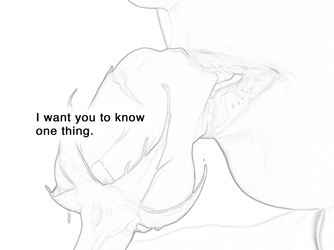
• “If You Forget Me” begins, “I want you to know one thing.” Let’s bear this mind while we go through the poem: what is that one thing?
• Now here is something interesting. Include the title, skip the line breaks, and read the beginning of the poem. It reads like this, “If you forget me, I want you to know one thing.” This comes off to us as a bit ominous and threatening. We admit this might just be our impression, and it might not have been the intention of the narrator.
• Another thing to notice here is the use of the literary technique called enjambment. This is just a fancy French way of noting that a line has left us hanging, waiting for the next line—which often thwarts our expectations. This poetic device is used throughout most of the poem.
• Finally, note the simplicity here. The entire stanza is a single statement, and given there is nothing else, this really strengthens it. If a person is continuously talking, you tune it out. If they say only one thing, you listen. This stanza says only “one thing.”
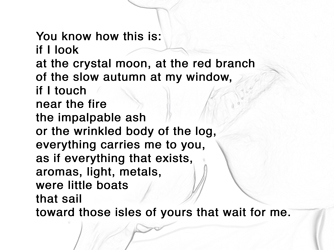
• The second stanza, starts, “you know how this is”—and then beautifully expresses a subtle feeling that we can all relate to. It is the idea of being in love such that every thought, every impression of the world around you, somehow leads you back to the object of your love. Love can be like a gentle obsession, and when we’re in love, every object is highlighted in such a way, that it is seen in the light that love. All objects bring us back to the object of our love. Neruda beautifully conveys this feeling.
• Now, let’s look at the objects specifically mentioned. These objects were something immediately present with Pablo Neruda when he wrote the poem. He was writing at the beginning December, so surely his room had a fire. Likewise, while the poem refers to autumn, it literally was (late) Autumn when the poem was written. Neruda was staying at a hotel just off a large lake in Switzerland, so surely he’d seen boats floating on the water that day. So, regardless of intention, these are all images that Neruda had just recently encountered.
• Note that the mood of the images here reflects passion, yet also calmness. There’s fire, but there’s also ash. It’s autumn—the leaves are red reflecting passion, but this is because they are dying. You have a log that could supply a fire, but it’s not burning. There are islands in the calm waters, but we’ve yet to sail to them. So what we have here is a really subdued passion—one that could potentially spring into even more fiery flames—but could just as easily die out.
• Note the nice contrast between touching an ash, which will be destroyed by your touch, and the log which is solid and won’t be. Ash symbolically represents passion was gone and untouchable. A log can potentially be burned and supply a fresh and new passion.
• Now, we admit it is a big stretch, but note you can find all the primitive elements here, earth as “log” and “metal”, water as “crystal” and “boats”, fire as “fire” and “ash”, finally air as “aromas” and “sails”. Could there be some hidden archetypes here? Perhaps some hidden symbolic meaning? We’ll leave that for you to decide.
• We would like to suggest that Neruda had no clear strategy when he wrote the poem. He didn’t sit down and work out which symbols and figurative language would be most appropriate for his design. He surely just wrote with a strong sense of intuition, and perhaps re-edited until he got the poem the way he wanted.
• We don’t want to stir up any controversy, but we know he wrote this in a hotel room in the early morning in the presence of his lover. We will merely note here that the subdued passion of the poem calls to mind post-coitus ruminations.
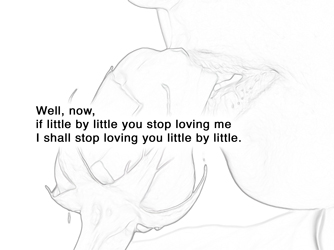
• The third stanza is another really short stanza making a very simple point. If you stop loving me, I’ll stop loving you.
• We feel this stanza is a bit of slap in the face. In the second stanza we’re grooving along with all the wonderful images of subdued passion and the wonders of love, and here we get this kind ultimatum. Look, if you stop loving me, I’ll stop loving you. Is love really like that? Is love so simple? What is going on here?
• The phrase “little by little” is probably of great significance here. It does suggest the element of time—such that we are talking about a process here. This does soften the impact of the statement. We have to admit that love can be like this when you separated from the person you love. At first, you cling to that love. You absolutely refuse to let go. That flesh and blood passion is still there with you. But eventually, as the memories begin to slip, it becomes more of an idealized commitment. Then, as the flesh and blood memories become more and more distant, that idealized commitment grows harder and harder. Some people wake up one morning, and they realize they’ve lost that loving feeling.
• “If you forget me” by Pablo Neruda is indeed a love poem. But it is one in which that love is not entirely secure. Remember the background for the poem. Neruda was carrying on a passionate affair but was still married. Moreover, he was an exile from his own country, living on the precarious good graces of whatever country he was currently fleeing too. Surely at the time, he had no way of knowing he would one day marry Matilde Urrutia. So this stanza and the two that follow are reflective of this uncertainty.
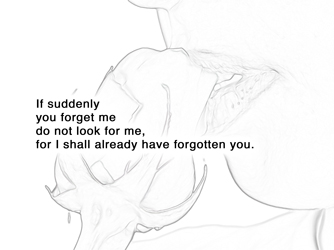
• There is an obvious strangeness to the fourth stanza. The narrator suggests that the love object of the poem will be forgotten if she forgets the narrator. Okay, that’s fine—but pay close attention to the sequence. It’s jarring and very important. By the time the love object of the poem forgets the narrator, the narrator will have already forgotten that love object. If you are not getting this point, you really need to pause, reread and think about the stanza until you do. There’s a sense here in which the narrator is suggesting they can already tell if the object of their love will be faithful or not. We don’t like to paraphrase, but this is a bit like saying the following: I can tell now by looking at you if you’ve made a commitment to me in your heart or not. If you haven’t, then I’ve already given up on you. This is an ultimatum. Show me you love me right now or else.
• Notice the contrast between “little by little” and suddenly. In the third stanza, the emphasis was on love and losing it, little by little. Here, the emphasis is on forgetting, and the word suddenly is used. Perhaps this can be explained in the following manner. We forget little by little until suddenly the memory is gone.
• To sum up, we interpret this stanza as follows. An ultimatum is being given. The love object of the poem is expected to give her utter allegiance to this love so that she will never forget the narrator and stop loving him. The narrator can tell right now whether she is really giving that commitment or not. If she is not, then he’s finished with her. The language may sound all flowery, but this is how the message comes across to us. You know, either you are with me completely and utterly—so that you will never forget me, or I am going to dump you before you even realize what’s happened.
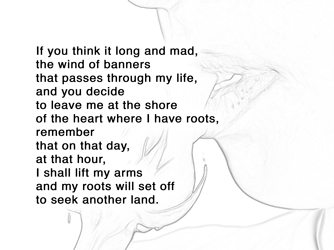
• The fifth stanza, again, reinforces the message of the third and fourth stanza, but we’re given a lot of images, symbols, and figurative language.
• The first three lines of the stanza are very important. They suggest that the narrator is basically fighting a righteous battle—remember the name of the book is the Captain’s Verses. It is a soldier’s book of poetry. This helps us understand why the fourth stanza issues such a strong ultimatum. It is sort of saying, I’m fighting a war on the side of good. Look at what I’m up against, either you accept the suffering my beliefs create for both of us, and thus really love me—or you do not, and thus this was just a momentary fling. I’ll forget you before you forget me.
• This is a bit harrowing, we think because the stanza suggests that basically, the mission triumphs over love. Or, at least, it suggests that if the love is real, then that both lovers must be in synch with the mission. So there is something very political here—and, like it or not, it suggests politics triumphs over love. It comes near to stating, communism is part of my life, and if you love me, then you must accept that part of me. If you can’t handle that, then this was just a fling, and I’ve already forgotten about you—before you’ve begun to forget about me.
• The use of the words “roots” and “land” are very important. These images are intended as metaphors, and they need not relate to just one thing. On one level, the roots we feel can represent the network of our memories, feelings, and thoughts. Remember the second stanza where Neruda notes, “everything carries me to you”. That is, my roots, my memories, my feelings, and my thoughts, all carry me back to you. But, if you don’t really love me and can’t accept the suffering I do for my lofty political ideals, then this isn’t a pure love. It was just a fling, and I’ll forget you before you forget me.
• As Neruda was an exile at the time as a result of his idealistic views toward communism, these lines about “roots” and “land” can also be seen in that light. He loves Chile, but if Chile can never truly embrace the one true philosophy, communism, then his feelings for Chile are temporal. He will cast Chile aside as if were a cheap love, a fling he had on the side. In other words, the poem can be read as an ultimatum to the nation of Chile.
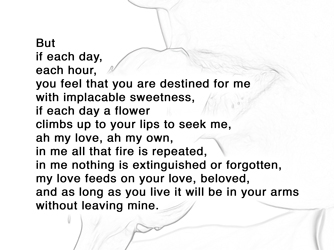
• The sixth stanza is probably the weakest part of the poem. We doubt most readers will catch this because the poem is a bit like a roller coaster. The first stanza gets you to sit up straight. The second stanza takes you to a great height, and then the third through fifth stanza is the rush down hill—while the sixth stanza is just a gentle coast to the end of the ride. But there’s simply not much to the sixth stanza, except, gosh, won’t life be beautiful once you’ve accepted that to accept me is accept my ideals.
• Note the reference here to destiny. Neruda thought communism was man’s destiny. The word communism has become poison for some, but Neruda thought of communism in very idealistic, lofty terms. He dreamed of a utopian world where we would all be brothers in arms, where society would no longer be stratified, and both equality and love would be the forces that dominated the world. He saw communism, in its true form, as the cure for much that ails society.
• The narrator knows he might be parted from the object of his love. He is saying that so long as her commitment to him is real, and he is constantly in her thoughts, then this will be reciprocated. She might not be able to directly kiss him, but she can kiss the flower. She might not have him literally in her arms, but she’ll have his love. The flower, of course, is a symbol of spring, which plays off the symbols of the second stanza—where everything there is related to autumn.

“If You Forget Me” by Pablo Neruda: Interpretation
From all we’ve said, we hope it’s clear what direction we intend to take our analysis of “If You Forget Me” by Pablo Neruda. We see the poem as first and foremost a love poem addressed to Matilde Urrutia. It demonstrates his great love for her. However, the poem is also issuing, however gently, a stark ultimatum. It is stating that to love the narrator is to accept all his ideals as an integral part of him. For Neruda, all his ideals were bound up in communism. So the poem is saying, I’m a warrior out in the world fighting for ideas, that’s who I am, will you accept this and still love me? If you don’t, then this love was never real, but just a short lived passion—a cheap fling. I’ll forget you before you forget me.
Now, many have said that the poem is actually—either explicitly or covertly—not really about Neruda’s love for Matilde Urrutia, but about his feelings for Chile. We are sympathetic to this point. We think the poem serves a dual purpose—it is not the case of one or the other. On some level, Neruda was a man who saw his love as inseparable from his idealistic politics. So, it would feel very natural for Neruda to make a comparison of his passion for Matilde Urrutia to that of his passion for his country. And, it fits very well here. If Chile, as a woman Neruda loves, rejects Neruda’s ideals, then he is going to reject and forget about Chile. Just like his relationship with Matilde Urrutia is now at a precarious stage—the future uncertain, so is Neruda’s relationship with his home country. There is a strong parallel between the two, and the poem rather ingeniously reflects that.
The question can be put this way, which theme dominates in “If You Forget Me”, Neruda’s passion for Matilde Urrutia or his passion for his country? We think we can view the poem this way, Neruda is using his situation as an exile, and the passion he feels for his country, as an extended metaphor for the passion he feels for Matilde Urrutia. So that, yes, while the poem can be read as an ultimatum to Chile—that reading is itself a metaphor for the poet’s love of Matilde Urrutia. Just as Neruda wants to return home some day, to a Chile that has recognized his political ideals, he likewise wants Matilde Urrutia to embrace the idealistic aspect of his character and to still keep loving him—and that is the primary point of the poem.

Final Thoughts
We feel the need to make a final note about communism. First, to admit our bias, we will state that all of us here at Shadow of Iris are crassly bourgeois. We support the classical liberalism that many of the Romantic period poets supported. We are first and foremost, antiwar, and we only advocate peaceful revolutions. While we feel that Pablo Neruda was a master poet, we also feel that at times, without intent, he used his skills to support a great deal of evil. For example his poems in support of Stalin and Marxism. We recognize this. At the same time, we are aware of Neruda’s own words in his Memoirs, where he states, “any judgment is possible in a diabolically confused era.” We cannot fully understand Neruda’s choices without understanding the context in which they were made. So, until we learn otherwise, we are content to see some of Neruda’s political choices as merely reflecting lofty ideals that lead him astray. We see this as only tragic and would prefer to defer judgment of Neruda’s eternal soul to someone else.
We hope you’ve found this analysis of “If You Forget Me” by Pablo Neruda useful and fun. So as not to miss any of our original poems and occasional analysis of poems, make sure to subscribe to our updates.